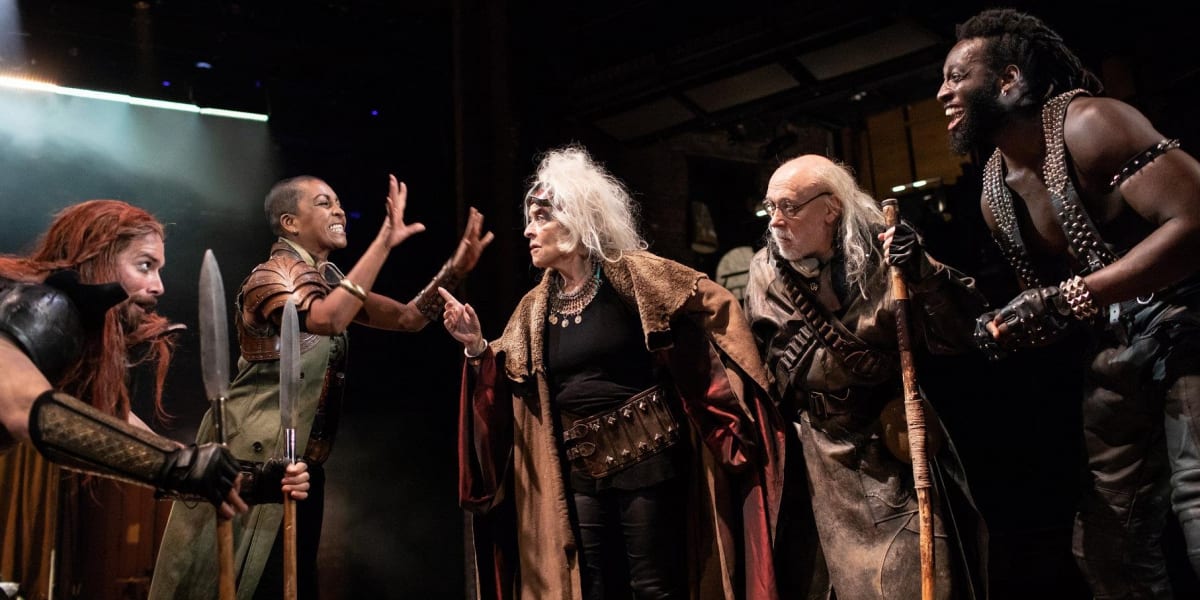Troilus and Cressida is a late and difficult Shakespeare play that is considered by many to be extremely problematic. The new RSC production goes some way to making it feel as if his text is both contemporary in understanding our world. By looking back bitterly at the Trojan War, Shakespeare undercuts the heroic view of warfare and shows it up to be chaotic, nasty and even juvenile. The world of the jaundiced politics of the Trojan War seems to portray our own increasingly flawed, manipulative and disordered times. Dressed by Niki Turner in a futuristic, biker-leathers, stud-laden style for the men, and working within a stylish, strange set, with motorcycles for steeds, the production also benefits from the original score by Evelyn Glennie that throughout percussively echoes the clashing of arms and the screams of battle, adding a level of energetic weirdness to the telling of this anti-heroic story.
The context of the love story is the stalemated time near the end of the Trojan War when Achilles withdrew from fighting and Ulysses had to trick him back into battle. Locked away in besieged Troy, Cressida and Troilus are in love; but she is too pragmatic to give in easily; and her egregious uncle Pandarus brings them together with a kind of salacious mirthfulness. Oliver Ford Davies plays the role brilliantly, with just the right amount of sympathy and erotically charged interest; and the most touching moments of the play are realised when Troilus and Cressida, like Romeo and Juliet, give in to their love for the brief time that is permitted them before the pressures of the war and politics separate them. Amber James is appealing as the clear-headed Cressida who ultimately gives in to expediency and Gavin Fowler is very sympathetic as the love-struck and then furiously disappointed Troilus.
The cynical manipulations of the great heroes of The Iliad almost overwhelm the play as they do the lovers. Greg Doran has elicited from his cast great clarity of interpretation. He has given the roles of many major male characters to women, a reversal of the practice in Shakespeare’s own time. This also acts to update the feel of the play, suggesting our current world when a woman might easily be a general or a serious advisor to the top ranking generals. Thus Ulysses wiliness and strengths are expertly portrayed by Adjoa Andoh and Agamemnon as memorably by a strutting Suzanne Bertish. I had to admit that I had difficulty adjusting to some of the castings at first because I felt that it changed many of the dynamics of the relationships. It also, for me, slightly interfered with the post-war stories to come: Ulysses wanderings, the patience of his Penelope, the murder of Agamemnon by Clytemnestra, the enslaving of the Trojan Women by the victorious Greeks.
But, in the end, it did not matter at all. The play seemed to me at times to reference Mad Max; and also the film Troy, with Andy Apollo’s Achilles convincing as a buffed up hero figure. Andrew Langtree was a suitably foolish Menelaus and Teho Ogundipe was an Ajax you will never forget. Daniel Hawksford was extremely touching as Hector, perhaps the only sane, stable grown-up in either the Trojan or the Greek camp. Sheila Reid was brilliantly cast as a tiny, wicked-tongued, foul-souled Thersites. The black and sour humour of the play was clearly on display. This is an excellent and thought-provoking evening of theatre, and this production will show you what an unjustly neglected work this is.

